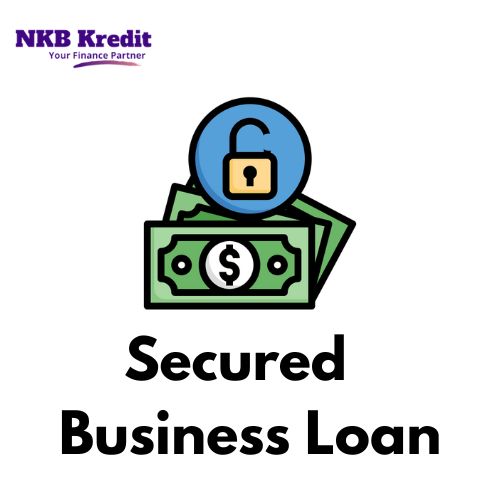Table of Contents

Introduction on Secured vs Unsecured Business Loans
Choosing the right secured vs unsecured business loan is frequently necessary for launching a new business or growing an existing one. Understanding the basics of business loans and choosing the right type of loan is crucial for the success of any business. In this comprehensive guide, we will explore the differences between secured vs unsecured business loans to help you make informed financial decisions.
1. Secured Business Loans

Secured business loans offer several advantages for borrowers. Let’s delve into the characteristics of secured loans and explore the different types available.
1.1 Definition and Characteristics of Secured Loans
Secured loans are loans backed by collateral, which is an asset that serves as security for the lender. This collateral mitigates the risk for the lender, making these loans more favorable in terms of interest rates and repayment options.
1.1.1 Collateral Requirement: Mitigating Lender’s Risk
The necessity for collateral is one of the characteristics that sets secured loans apart. Lenders typically ask borrowers to pledge valuable assets, such as real estate, equipment, or inventory, as collateral. By doing so, lenders have a safety net in case the borrower defaults on the loan.
1.1.2 Lower Interest Rates: The Advantage of Security
Since secured loans involve collateral, they carry less risk for lenders. As a result, lenders offer lower interest rates compared to unsecured loans. This cost-saving advantage can provide businesses with substantial savings over the loan tenure.
1.1.3 Longer Tenure: Flexible Repayment Options
Secured loans often come with longer repayment tenures. This flexibility allows borrowers to have lower monthly payments, reducing the strain on their cash flow. Businesses can choose a repayment period that aligns with their financial capabilities and goals.
1.2 Exploring Different Types of Secured Business Loans
Now that we understand the characteristics of secured loans, let’s explore some of the different types available:
1.2.1 Traditional Bank Loans: The Trusted Choice
Traditional bank loans are the most common type of secured business loans. These loans are ideal for established businesses with a solid credit history. Banks often require a comprehensive business plan, financial statements, and collateral to secure the loan.
1.2.2 SBA Loans: Government Support for Small Businesses
Small Business Administration (SBA) loans are another option for secured financing. The SBA works with lenders to provide loans to small businesses by guaranteeing a portion of the loan. These loans often come with favorable terms and lower interest rates, making them attractive for small businesses.
1.2.3 Asset-Based Loans: Harnessing the Value of Assets
Asset-based loans are secured by a company’s assets, such as accounts receivable, inventory, or equipment. Lenders evaluate the value of these assets to determine the loan amount. Asset-based loans are suitable for businesses with valuable assets but may carry higher interest rates than traditional bank loans.
1.3 Pros and Cons of Secured Business Loans
Before deciding on a secured business loan, it’s essential to consider both the advantages and potential risks.
1.3.1 Advantages of Secured Loans for Borrowers
Secured loans offer several advantages for borrowers. They generally come with lower interest rates, longer repayment periods, and larger loan amounts. Additionally, secured loans can assist companies in establishing or enhancing their creditworthiness.
1.3.2 Potential Risks and Considerations
While secured loans offer benefits, borrowers must be aware of the potential risks. If they default on the loan, lenders can seize and sell the collateral to recover their funds. Failure to repay a secured loan can have severe consequences on both personal and business credit scores.

2. Unsecured Business Loans

Unsecured business loans provide an alternative option for borrowers who don’t have valuable assets to pledge as collateral. Let’s delve into the characteristics of unsecured loans and explore different types available.
2.1 Definition and Characteristics of Unsecured Loans
Unsecured loans are not backed by collateral. These loans rely on the borrower’s creditworthiness and trustworthiness, and therefore carry a higher risk for lenders. To compensate for this increased risk, unsecured loans typically have higher interest rates and shorter repayment tenures.
2.1.1 Absence of Collateral: Borrowing Based on Trust
Collateral is not required for unsecured loans, in contrast to secured loans. Borrowers are eligible for these loans based on their credit history, business revenues, and personal guarantees. Lenders rely on trust and the borrower’s ability to repay the loan.
2.1.2 Higher Interest Rates: Compensating for Risk
Because unsecured loans lack collateral, lenders charge higher interest rates to mitigate the risk. These rates can vary based on factors such as credit score, business stability, and loan amount. It’s crucial for borrowers to carefully assess the interest rates and determine if the loan is financially viable.
2.1.3 Shorter Tenure: Quick Access to Funds
Unsecured loans often have shorter repayment tenures compared to secured loans. Borrowers can quickly access the funds they need, allowing them to address immediate financial requirements. However, the shorter repayment period can result in higher monthly payments and potentially strain the business’s cash flow.
2.2 Exploring Different Types of Unsecured Business Loans
Let’s explore some of the different types of unsecured business loans available:
2.2.1 Business Credit Cards: Convenient and Flexible Financing
Business credit cards provide easy access to funds for day-to-day expenses. These cards come with credit limits, allowing businesses to make purchases and repay the amount borrowed over time. Business credit cards offer convenience and flexibility but can carry high interest rates if not used responsibly.
2.2.2 Invoice Financing: Utilizing Unpaid Invoices
Businesses can use invoice finance to borrow money against their overdue invoices. Lenders provide funds based on the value of the invoices, helping businesses bridge the gap between invoicing and receiving payment. This type of loan can be beneficial for businesses facing delayed payments from customers.
2.2.3 Merchant Cash Advances: Borrowing against Future Sales
Merchant cash advances provide businesses with upfront cash in exchange for a percentage of their future sales. Repayment is made through a predetermined portion of daily or weekly credit card sales. While this option offers quick access to funds, it can be expensive due to high interest rates and fees.
2.3 Pros and Cons of Unsecured Business Loans
Let’s consider the advantages and potential risks of unsecured business loans.
2.3.1 Advantages of Unsecured Loans for Borrowers
Unsecured loans offer advantages such as quick access to funds, simplified application processes, and flexibility. They are particularly useful for businesses without valuable assets to pledge as collateral. Unsecured loans can also be an opportunity to build a credit history for new or growing businesses.
2.3.2 Potential Risks and Considerations
Unsecured loans come with risks that borrowers should consider. Higher interest rates and shorter repayment tenures can put a strain on the business’s cash flow. Additionally, defaulting on an unsecured loan can negatively impact credit scores and limit future financing opportunities.
3. Choosing the Right Option
Deciding between secured and unsecured business loans depends on various factors. Let us examine the crucial factors to ensure that you make the best decision.
3.1 Factors to Consider in Decision-Making
When evaluating business loan options, consider the following factors:
3.1.1 Credit Score and Financial History
Lenders assess credit scores and financial history to determine the borrower’s creditworthiness. A strong credit score can increase the chances of securing favorable loan terms. Understanding your credit history is essential before applying for a loan.
3.1.2 Loan Amount and Purpose
Consider the amount of funding required and the purpose of the loan. Secured loans often allow for larger loan amounts, making them suitable for significant investments or expansions. Unsecured loans are more suitable for smaller funding needs or immediate financial requirements.
3.1.3 Business Stability and Future Projections
Lenders typically evaluate the stability of a business and its ability to generate future revenues. A well-established business with a proven track record is more likely to qualify for better loan terms. New or growing businesses may find it challenging to secure secured loans without a strong financial history.
3.2 Evaluating Risks and Benefits
It is essential to analyze the risks and benefits associated with each loan option.
3.2.1 Assessing Personal and Business Assets
Secured loans require collateral, which can include personal or business assets. Consider the implications of pledging assets and the potential risks involved. Unsecured loans offer the advantage of not risking valuable assets.
3.2.2 Weighing the Cost of Borrowing
Compare the interest rates, fees, and associated costs between secured and unsecured loans. Consider the overall cost of borrowing and its impact on the business’s financial health. Calculate the total repayment amount to assess which loan option is more cost-effective.
3.2.3 Impact on Credit Score and Future Financing
Defaulting on a secured or unsecured loan can negatively impact credit scores. Consider the importance of maintaining a good credit score for future financing needs. Timely repayment is critical to building a positive credit history.
3.3 Seeking Professional Advice: Consulting with Financial Experts
Making an informed decision requires proper guidance. Seek advice from financial experts who can assess your specific situation, offer personalized insights, and help you navigate the complex world of business loans. Professionals can assist with loan applications, financial planning, and understanding the long-term implications of borrowing.
Also read: Exploring Your Best 5 Business Financing Options
4. Summary
Secured and unsecured business Funding provides businesses with the financial support they need to grow and thrive. Secured funding leverages collateral and offers advantages such as lower interest rates and longer repayment tenures. Unsecured funding, on the other hand, do not require collateral but may have higher interest rates and shorter repayment tenures. To make an informed decision, consider factors such as credit score, loan amount, business stability, and future projections. Seek professional advice from financial experts and assess risks and benefits carefully. With this comprehensive understanding, you can confidently choose the right loan option for your business.
5. Frequently Asked Questions (FAQs)
What is the main difference between secured business loan and unsecured business loans?
Secured loans require collateral, while unsecured loans do not. This difference influences interest rates, repayment terms, and the inherent risks for lenders.
Are unsecured loans suitable for newly established businesses?
Unsecured loans can be suitable for newly established businesses, especially if they lack valuable assets to pledge as collateral. However, it’s important to consider the higher interest rates and shorter repayment tenures associated with unsecured loans.
What are the potential risks of securing a loan with personal or business assets?
Pledging personal or business assets as collateral puts them at risk if the loan is not repaid. Defaulting on a secured loan can result in the loss of valuable assets, negatively impact credit scores, and limit future financing opportunities.
How can a borrower improve their chances of obtaining a desirable loan?
Maintaining a strong credit score, developing a comprehensive business plan, demonstrating stability and growth potential, and seeking professional advice can significantly improve a borrower’s chances of securing a desirable loan.





[…] Secured vs Unsecured Business Loans: Easy guide to Choosing one Exploring Your Best 5 Business Financing Options […]
[…] Secured vs Unsecured Business Loans: Easy guide to Choosing one […]
[…] Secured Loans vs. Unsecured Loans: Whereas unsecured loans don’t need collateral, secured loans must. Because there is less risk for lenders, secured loans typically offer lower interest rates. […]